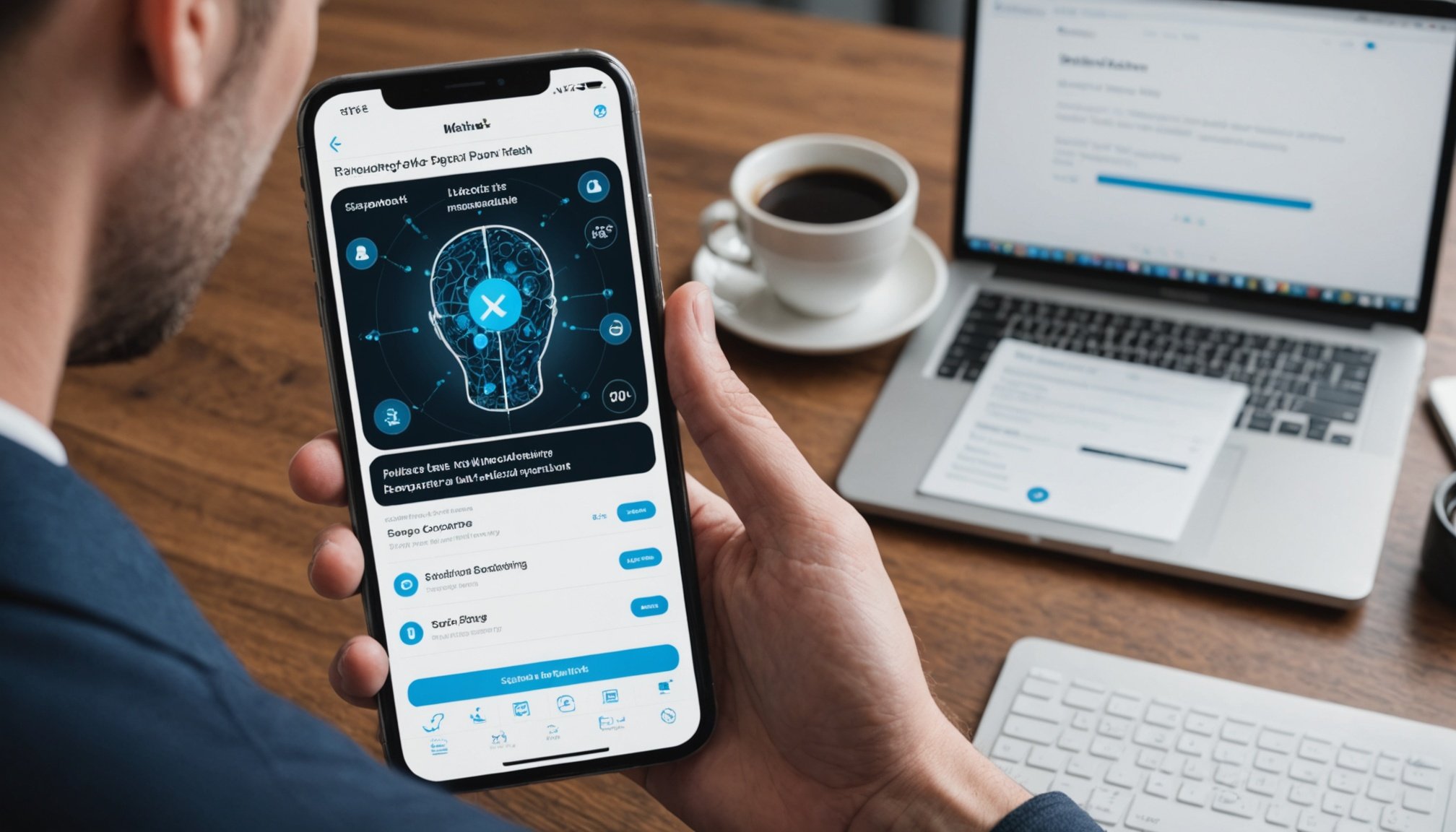Overview of AI Technologies in Mental Health Apps
The integration of AI technologies into mental health apps marks a significant advancement in healthcare. These apps utilize a variety of AI-driven techniques, primarily machine learning and natural language processing, to offer personalized support and timely interventions. Machine learning empowers apps to learn from user data, adapting interventions based on evolving needs and behavioural patterns. Conversely, natural language processing enhances user interaction by understanding and responding to textual input with a high degree of specificity and empathy.
The benefits of AI in mental health extend to improving outcomes through efficient, scalable resources. By offering 24/7 real-time support, these applications provide users immediate assistance, which is especially vital during moments of heightened emotional distress. Furthermore, AI’s ability to analyse vast datasets enables the identification of patterns that might elude traditional therapists, leading to improved early intervention strategies.
Also to see : Transform Your Space: Seamless Temperature Control and Monitoring Using Smart Thermostats via Your Smartphone
AI’s role in mental health extends beyond reactive support; it also fosters proactive well-being through predictive analytics. This technology anticipates potential issues and suggests preventive measures, becoming a vital component of comprehensive mental health care frameworks.
Case Studies of AI-Driven Mental Health Apps
Examining case studies of successful AI-driven mental health applications provides crucial insights into their impact. These success stories highlight the transformative potential of AI technologies in this domain. For instance, some apps have utilized machine learning algorithms to offer personalized therapy plans based on user data, resulting in improved engagement and outcomes. Real-world implementation of these applications has demonstrated significant strides in user satisfaction.
In parallel : Maximize Your Smart Home: The Definitive Smartphone Handbook for Tracking Solar Panel Energy Efficiency
One prominent success story involves an app utilizing natural language processing to provide empathetic real-time conversations, enhancing user support. The app’s ability to engage users through meaningful interactions underscores the efficiency of AI in fostering emotional connectivity. Furthermore, these studies reveal lessons in scalability, indicating how AI can efficiently manage increasing demands without compromising service quality.
Lessons learned from such implementations underline the importance of user-centric design. Developers have recognized the necessity of integrating user feedback into the app development process to better cater to diverse needs. By understanding these experiences, we see how AI-driven apps pave the way for innovative solutions and highlight the dynamic interplay between technology and mental health support.
Benefits of Enhanced Tracking in Mental Health
Mental health tracking bolstered by AI technologies provides significant benefits in therapeutic applications. Real-time tracking offers invaluable insights into user behaviour, aiding in personalised mental health improvement. With AI’s dynamic algorithms, users experience a deeper level of engagement, as the application can adjust to their current emotional and mental state. This constant adaptation not only keeps users informed of their progress but helps maintain commitment to their mental health goals.
Enhanced user engagement is a direct result of AI features within these apps. By using intricate AI-driven systems, apps can craft an experience tailored to the user’s preferences and emotional needs. Engagement is heightened, with users more likely to interact consistently with the app’s features, thus promoting better mental health outcomes.
The correlation between tracking data and timely interventions is a cornerstone of AI’s efficacy in this domain. With the ability to detect subtle changes in mood or behaviour, mental health apps can prompt early interventions, reducing the risk of severe emotional distress. These proactive measures, supported by extensive data analysis, ensure that users receive the most appropriate support when they need it.
User Testimonials and Experiences
Insights from user testimonials reveal meaningful experiences with AI-driven mental health apps. Many users have shared how these apps have been pivotal in their mental wellness journeys. Through detailed user experiences, we observe common themes of enhanced accessibility and personalised support, which traditional methods often lack. Users appreciate the 24/7 availability and tailored responses, contributing to a greater sense of empowerment and control over their mental health.
Personal stories emphasise the value of immediate support during crises. One user recounted receiving timely intervention during periods of anxiety, underscoring how AI-enabled apps can adapt dynamically to emotional fluctuations. These narratives highlight the role of technology in addressing urgent psychological needs effectively.
Compiling this mental health feedback allows developers to iterate on app features, ensuring they cater to diverse populations. Shared experiences spotlight not only the technological success but also the areas necessitating improvement, urging stakeholders to constantly refine app functionalities. Through analysis of these testimonials, patterns emerge, underlining the necessity for continuous innovation in the field of mental health technology to meet evolving user expectations.
Comparisons with Traditional Mental Health Monitoring Methods
AI-driven apps represent a significant shift in mental health monitoring techniques compared to traditional methods. Traditional mental health monitoring primarily relies on in-person consultations, which can be infrequent due to scheduling constraints and costs. In contrast, AI technologies provide real-time, continuous monitoring, offering immediate data analysis and insights. This capability fills gaps often encountered in traditional settings, where issues may go unnoticed between sessions.
In terms of cost-effectiveness, AI-driven applications often present lower long-term costs for users. While the initial investment in developing these technologies can be high, the scalability and automated nature of AI systems allow them to support numerous users without a corresponding increase in operational costs.
Moreover, accessibility improvements are pivotal. AI apps break geographical and physical barriers, reaching individuals in remote areas where mental health resources are limited. Traditional methods can’t easily match this level of accessibility.
Finally, AI can process large volumes of data quickly, enhancing the ability to detect patterns and predict outcomes. While traditional methods offer human empathy, AI adds an analytical edge, creating a complementary approach to comprehensive mental health care.
Expert Opinions on AI in Mental Health
Feedback from mental health professionals reveals varied insights into AI’s role in this field. Experts acknowledge that AI technologies can offer expansive data analysis and consistent monitoring, styles not always feasible in human-only interventions. While many practitioners see AI-driven applications as complementary to traditional methods, they highlight the importance of blending human empathy with AI precision.
Professionals are also optimistic about AI’s potential; they foresee a future where AI in mental health monitoring becomes more personalised and accurate, ultimately shaping new therapeutic approaches. Yet, alongside this potential, ethical considerations remain a significant focus. Privacy and data security top the list of concerns, demanding stringent measures to ensure confidentiality and integrity of users’ sensitive information.
Additionally, the potential biases in AI algorithms prompt scrutiny. Mental health professionals stress the need for transparency in AI applications to prevent skewed results that might arise from underlying biases in training data. Solutions such as inclusive datasets from diverse populations and regular AI system audits are recommended to mitigate these ethical dilemmas, thus maintaining trust in AI-enabled mental health care.
Challenges and Ethical Considerations
Implementing AI technologies in mental health apps presents various challenges and raises significant ethical considerations. One primary concern is ensuring data privacy, as user interactions within these apps can contain sensitive personal information. Maintaining strict confidentiality protocols is crucial to protect users’ privacy and encourage trust in these digital platforms.
AI systems often face the predicament of addressing potential biases. These biases might emerge from the datasets used in training the algorithms, which could inadvertently lead to skewed outputs. To counter this, developers must employ diverse datasets representing various demographics to ensure fair and accurate mental health solutions.
Another challenge lies in safeguarding the ethical use of user information. Ensuring transparency about how data is collected, stored, and utilised is essential in maintaining ethical standards. Users should be informed clearly about data handling practices and be given control over their data usage.
For AI in mental health apps to be successful, it’s essential to address these challenges with careful and thought-through strategies. By doing so, the apps can continue to provide reliable and ethical support for users on their mental health journeys while overcoming potential hurdles.










